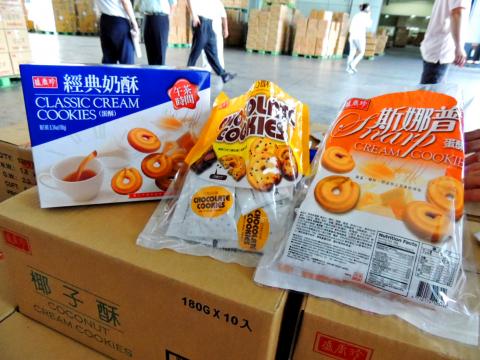People should eat more vegetables and fruits as well as drink plenty of water if they are afraid of consuming products containing swill mixed with various other oils produced and sold as lard, toxicology experts said.
Following edible oil industry crises in October last year, the industry has again been shaken after Pingtung County received tips of a factory manufacturing tainted oil, allegedly headed by Kuo Lieh-cheng (郭烈成), whose company reportedly reclaimed oil from kitchen waste as well as grease out of leather processing plants, and sold the final product to Chang Guann Co (強冠企業).
The Food and Drug Administration’s investigation into the case so far suggests that Kuo mixed his products in a 1:1:3 ratio, using one part each of recycled oil and three parts of lard per mixture.

Photo: Ou Su-mei, Taipei Times
Linkou Chang Gung Memorial Hospital department of clinical toxicology director Yen Tsung-hai (顏宗海), said that the swill was easily oxidized, and that due to the unsanitary location where it was processed, may contain large amounts of germs, aflatoxin and benzopyrene, the latter two of which are carcinogenic.
Though swill commonly refers to liquid waste, in this instance it specifically refers to recycled oil collected from various sources such as kitchen fryers, restaurants and grease traps.
Yen also said that if oils from leather fabrication were used, depending on whether the leather had been dyed, minute traces of heavy metals such as chromium or arsenic may be present, adding that such materials often damage the livers and kidneys.
Yen said that eating vegetables would help the body rid itself of aflatoxin, adding that fruits rich in vitamin C would also help expel benzopyrene.
Separately, colon and rectal surgery expert Wang Jaw-yuan (王照元) said that whether the case has direct correlation with Greater Kaohsiung’s and Greater Tainan’s surge in death rates of patients with colon and rectal cancer over the past years required further research.
Meanwhile, Consumers’ Foundation secretary-general Lei Li-fen (雷立芬) yesterday said the government had failed to ensure that manufacturers check products themselves or send them for independent inspection.
Lei said that Chang Guann Co had been honored with an award from the General Chamber of Commerce.
According to Lei, the government or business groups, while bestowing awards on manufacturers, have not been rigorous in checking if the enterprises have carried out their social responsibilities.
These, she said, are the reasons why major food companies like Wei Chuan Foods Corp (味全食品工業), one of the nation’s oldest and biggest food enterprises, have been involved in food scandals.
Lei also faulted consumers for their weak responses to the scandals, which she said allowed food enterprises to consider only their own interests and profits and ignore the need for establishing proper safety controls.
Additional reporting by Huang Chia-lin, Lin Hui-chin and Huang Yi-ching

INVESTIGATION: The case is the latest instance of a DPP figure being implicated in an espionage network accused of allegedly leaking information to Chinese intelligence Democratic Progressive Party (DPP) member Ho Jen-chieh (何仁傑) was detained and held incommunicado yesterday on suspicion of spying for China during his tenure as assistant to then-minister of foreign affairs Joseph Wu (吳釗燮). The Taipei District Prosecutors’ Office said Ho was implicated during its investigation into alleged spying activities by former Presidential Office consultant Wu Shang-yu (吳尚雨). Prosecutors said there is reason to believe Ho breached the National Security Act (國家安全法) by leaking classified Ministry of Foreign Affairs information to Chinese intelligence. Following interrogation, prosecutors petitioned the Taipei District Court to detain Ho, citing concerns over potential collusion or tampering of evidence. The

Seventy percent of middle and elementary schools now conduct English classes entirely in English, the Ministry of Education said, as it encourages schools nationwide to adopt this practice Minister of Education (MOE) Cheng Ying-yao (鄭英耀) is scheduled to present a report on the government’s bilingual education policy to the Legislative Yuan’s Education and Culture Committee today. The report would outline strategies aimed at expanding access to education, reducing regional disparities and improving talent cultivation. Implementation of bilingual education policies has varied across local governments, occasionally drawing public criticism. For example, some schools have required teachers of non-English subjects to pass English proficiency

‘FORM OF PROTEST’: The German Institute Taipei said it was ‘shocked’ to see Nazi symbolism used in connection with political aims as it condemned the incident Sung Chien-liang (宋建樑), who led efforts to recall Democratic Progressive Party (DPP) Legislator Lee Kun-cheng (李坤城), was released on bail of NT$80,000 yesterday amid an outcry over a Nazi armband he wore to questioning the night before. Sung arrived at the New Taipei City District Prosecutors’ Office for questioning in a recall petition forgery case on Tuesday night wearing a red armband bearing a swastika, carrying a copy of Adolf Hitler’s Mein Kampf and giving a Nazi salute. Sung left the building at 1:15am without the armband and apparently covering the book with a coat. This is a serious international scandal and Chinese

TRADE: The premier pledged safeguards on ‘Made in Taiwan’ labeling, anti-dumping measures and stricter export controls to strengthen its position in trade talks Products labeled “made in Taiwan” must be genuinely made in Taiwan, Premier Cho Jung-tai (卓榮泰) said yesterday, vowing to enforce strict safeguards against “origin laundering” and initiate anti-dumping investigations to prevent China dumping its products in Taiwan. Cho made the remarks in a discussion session with representatives from industries in Kaohsiung. In response to the US government’s recent announcement of “reciprocal” tariffs on its trading partners, President William Lai (賴清德) and Cho last week began a series of consultations with industry leaders nationwide to gather feedback and address concerns. Taiwanese and US officials held a videoconference on Friday evening to discuss the